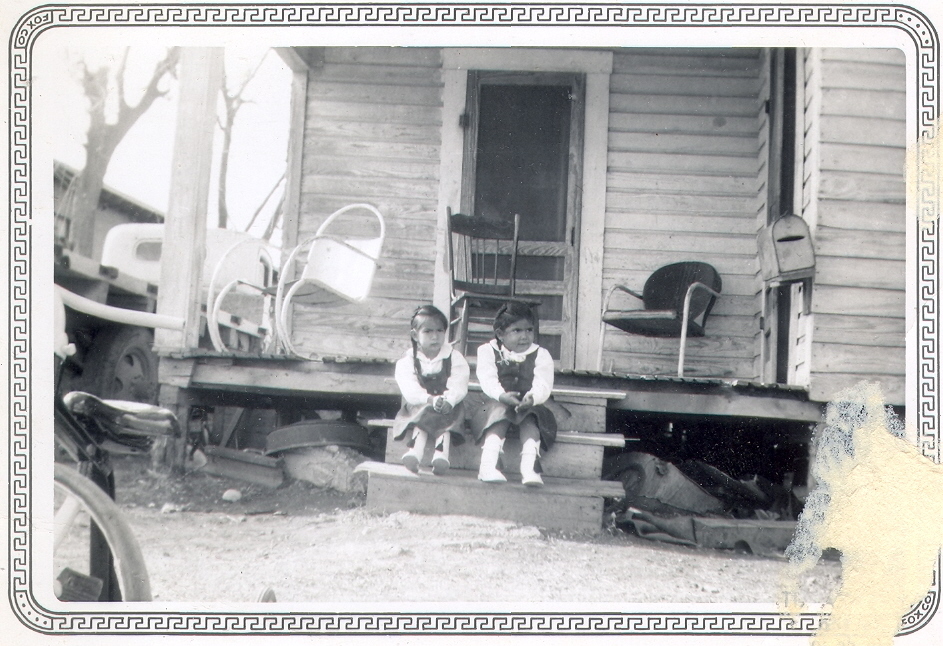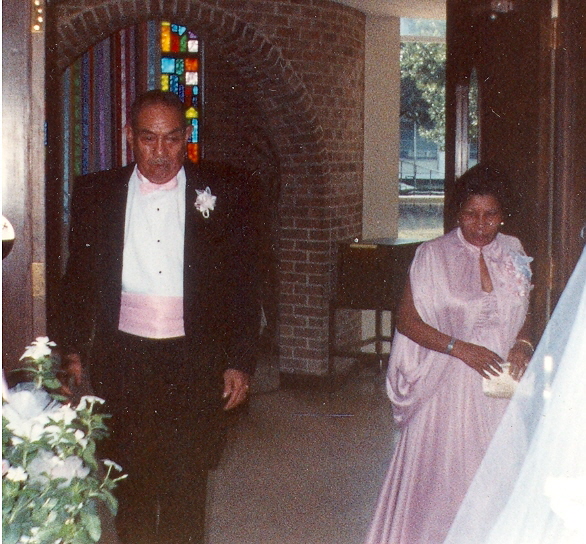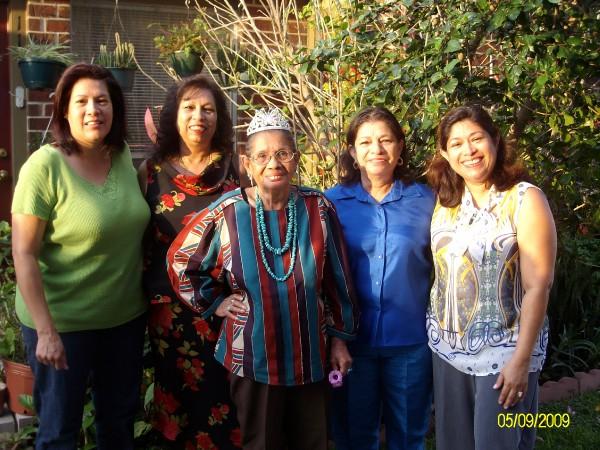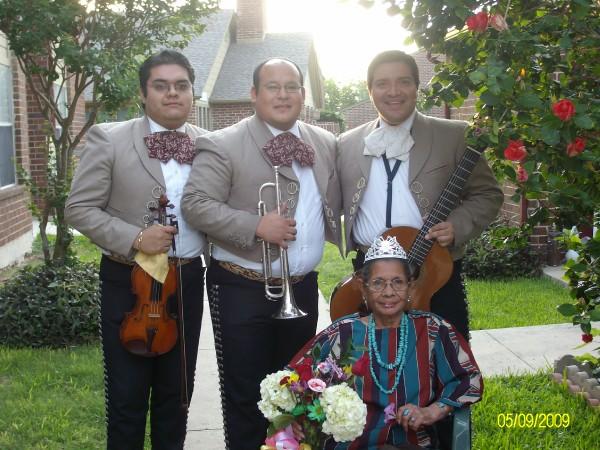TRANSCRIPTION
Did you have any role models growing up?
No, no I didn't, and without that I think I did pretty good.
What did you dream of doing when you grew up?
Can't really think of anything because at those times dreams were nothing, so I stayed with my mother as longs as I could.
How many people in your family worked growing up?
All of us, my sisters, my mother and myself, we all had to work if we wanted to survive. Life was hard and people were struggling.
Can you describe a typical day from your childhood?
Well, I would get up in the morning, go with my mother and collect dirty laundry from other people so we wash it for them. After washing the clothes we had to iron them, and then return them. Sometimes if the people we were washing the laundry for had extra money they would give us $5.. Other days, I would was diapers for the neighbors or clean onions for other people. Bunches and bunches of onions, the green ones, I think they are called chives. Other times just help people from across my house.
How would you wash the clothes?
We used a wash board to wash the clothes, yeah, a wash board. After that we would put them in a big black pot of boiling water. To make the water boil we would put bricks and make a fire and then put the pot on top, we would also put blue dye so the clothes would come out nice and clean and then we would dry the clothes on the clothes line and finally I would have to iron them.
Why would they want you to clean their onions?
Well, the people who would group onions, like the ones who had little farms, you know, they would want their onions cleaned to sell them. They would put them in boxes and boxes and gave them to people to clean them to take to the markets, or sell them on the street corners, so that's why I would clean them.
Was food expensive?
It wasn't expensive; there just wasn't any money to buy it with. But when President Roosevelt passed the Relief Bill, it gave relief. We were able to eat, at least for a while. In burlap sacks they would give us eggs, powdered milk, some butter, some cheese, a can with meat, and even stamp books too. We had to be careful with all that because it was only given to us once a month and most everyone had big families.
What Relief Bill was that?
The social security bill, at the same time he passed the bill for low income families to get welfare. But it was different, it was not money, it was for food.
What did you do for fun when you had time?
I loved to play jacks, and marbles (laughs), the only thing I didn't do was ride a bike, and the neighbor boys didn't want to lend the bikes, cause they had and I didn't.
Why didn't you go to school? Whose choice was it?
Poverty was the choice, no one else. I had to help my mother wash clothes. My father died when I was 7 so we had to make a living. Since I was the youngest I was the only one who stayed with my mother, everyone went off and got married.
What did the boys and girls do different?
Well, some boys were looking for work; they wouldn't annoy the girls at all. On Sunday you could see them going to the theater, or on Saturdays. And I know 'cause that is when I was working at the restaurant washing dishes and they would stop by and eat a hamburger and coke and then go next door to the movies. But never you saw one boy and one girl; it was always like 5 boys and 5 girls.
Where did you meet your husband?
He was my neighbor.
Why did you decide to get married at a young age?
Because something happened to my mother she became a drunk and she would beat me. Then, I met (great) grandpa, he lived next door, and asked me out. But, I didn't have any dress shoes, just tennis shoes. The fourteen dollars I would get from working I had to give them to my mother. My sister-in-law sold me some dress shoes for $1.50. She said I could work the money off. And the next time he asked me out, I did. By the third time, he was discharged from the army, and I made him sleep, so I could get pregnant. I know that he would marry me and take me out of the house and away from my mother. I am sorry that you had to learn this; it is something very private to me.
Where did you all live after you got married?
We moved to a house, oh yes, your (great) grandpa rented a house.
Now did you have a car?
Yes, he had a car, so we always had a car.
What kind of car did you all have?
Oh gosh, he had so many, let's see, what model was the first? I think it was a Ford. It was big, but had a small back window. Not like the ones now, and it was not automatic. I have a picture I think. (Could not find the picture)
After you got married did you have any jobs?
No, I never worked, he never let me.
What did you enjoy most about having a big family?
Oh that I had my own home and my own family to take care of. I would work for them, I would cook and clean for them and I didn't have to do it for others anymore.


What was something you would do with your children on a regular basis or for fun?
Well, we would go to church on Sundays, and then we take them to the park, yup all the time.
Since you didn't go to school, how did you learn to read?
I taught myself to read, when your Da-Da (my grandmother) and Tia Mary started going to school, they would bring home books and I would use them and your (great) grandpa would bring home the newspaper everyday so I would use that too. I would pay attention to the TV a lot, like the letters they would show so I knew what letter it was and then the words, the only thing I didn't learn was to write.

When Manuel was in Germany, how would you feel when you would get letters and pictures from him?
It was wonderful to hear from him, that way I would know that he was alright and to know that he would think of his mother was great. To know that he loved me to, I liked getting his letters, it was good.


What changes have you seen in San Antonio, or just changes overall?
Well the changes, it's all these children; they're killing each other, besides that, nothing really different from when I was younger. Still hungry people all over, no Medicare for the elderly, still the same from when I was young. Lots of times we went to sleep hungry because we didn't have nothing to eat.


What did growing up in hard times do for you today?
I'm very careful now. I make sure I don't go hungry and sometimes, I have two or three dollars and someone will ask me for change, I will give them half of what I got. Because when I didn't have food, I would ask the nuns at church and they wouldn't ask me if I was lying about being hungry. I always had to take the bowls back; sometimes they would give us eggs or potatoes.

What are your hopes for the future?
I hope God will grant me health, so that u can see my grandchildren grow up, and my great-grandchildren. Most of all I hope that one day there is peace in the world. We need peace in the world. Men are disappearing too, because of the war, there are no more.


What was one of the most important things you tried to teach your children or something you always told them to remember?
To be honest and to love each other because that's all they have. No matter if they are angry at each other or yell at each other they are always going to be there. If there is an emergency or need something and they yelled at each other or are angry they can still call them and they will be right there to help them. So it was to always love each other no matter what.
Is there anything else you would like to add to this interview?
Well, what I would like to add to this interview is how greatful I am to God for giving me good health and letting me live 75 years and that I hope he gives me mercy to live a lot longer. That way I can see my grandchildren and great grandchildren and even great great grandchildren have children. And that I am thankful for all the things he has given us, we have it good considering how other people have it, we are very fortunate. We are not rich but we have money and are able to eat every day, and a lot of people are not. We help people when we can and I taught my children never to neglect a plate of food to anyone, and they never have. And I am happy that you wanted to know more about my life, when I was little, my children and how everything was for me, and happy you chose to interview me.. Thank You and I Love You. Ok, now when you gonna pay me for the interview? I don't do this for free.(laughs) And also I want add for you to be grateful for what you have and take care of what you have, when you are older you are going to look back and see how much better things are then what they are now and then what they were when I was younger. And remember to take care of your brothers and sisters no matter what. (Went on to talk about my brothers and sisters)


ANALYSIS
By interviewing my great-grandmother Dolores I learned so much, not only about her life growing up but also how things were difficult for many families. I think that the most important points in the interview were from her childhood and younger teen days were she talks about how she had to work so hard to help her mother, just so they could survive. One thing I did learn from my great-grandmother that I did not know before was her story on why she decided to have her first child at a young age. It is not something that I am embarrassed of or ashamed to have found out, it was how hard things were for her that made her make that decision. I never really knew about what it was like for my great-grandmother growing up, I knew things were hard during those times but I never really thought that someone close to me was affected that much. During the interview I could see that so many memories were coming back to her when she would think about the question or show me a picture. When the questions were more on a serious note for her she sounded very serious and when she would think of lighter thoughts her tone would change. Stories that I was told after the interview helped me understand things in the past a lot more and so after she would tell me a story I would go back and find pictures that seemed to be around that time period and I would find pictures that went with the stories.
There are many benefits about learning about the past through the oral history process because it keeps you more into learning. You are actually hearing someone else's life and not just having to read it from a book. The interviewee takes you back with them and it seems you were there with them, experiencing what they went through, or at least getting a better understanding of it. It keeps you interested and anxious to know more. You get to ask follow up questions do make sure you completely understand what was going on. Overall, the oral history process is a good way about learning about the past, especially for those who are not so much into history. It will keep the interviewer entertained and into the interviewee's life. A down part to the oral history process is that it is a process and you just want to keep adding more and more to the interviewee's life. You want stories that go along with every picture that the interviewee may not remember and you just want to keep adding more questions. I think the oral history process can go on and on and on until the interviewee has no more stories to tell and that, will keep you interesting in learning more about the past.
TIMELINE
- Dolores Musquiz born on Feb. 27, 1934 to Felicidad and Roberto Musquiz in San Antonio, Texas
- 1948 had first job at the age of 14 washing dishes
- At the age of 16 married Manuel Garcia on
- Gave birth to Gloria Garcia on Nov. 21, 1950
- Gave birth to Maria Luisa Garcia on Jan. 10, 1952
- Gave birth to Marcella Garcia on Feb. 18, 1954
- Gave birth to Esperanza Garcia on Sept. 29, 1955
- Gave birth to Manuel Garcia on Oct. 23, 1956
- Gave birth to twins Roberto and Freddy Garcia on Mar. 24,1959
- Gave birth to Cecilia Garcia on Sept. 21, 1962
- Gave birth to Janie Garcia on Nov. 7, 1963
- Gave birth to Dolores Garcia on Nov. 8, 1969
- Death of husband Manuel Garcia on June 5, 1995
- Oldest son Manuel Garcia passed away 2003
- Oldest daughter Gloria Garcia passed away Feb.3, 2005
- Interviewed by great-granddaughter Samantha Ann Ortiz in October and November 2009
ANNOTATED BIBLIOGRAPHY
- The Guadalupe Theater is located west of downtown San Antonio, many plays and shows can still be seen there today.
- Cost of Living Calculator helps calculate and compare the cost of living between different time periods.
- How to Play Jacks,this website helps you understand the concept of the game of jacks, that was very popular during the Great Depression Era.
- How to Play Marbles,this website gives you in dept instructions and showing of how to play marbles.
- President Roosevelt, gives more information of what President Roosevelt did and about his life.
- Washboard shows other washboard as well as other antiques and gives brief description of how they were used.
- Photographs and/or documents on this website were provided by Dolores Garcia. Pictures can be found through the photo albums that dated from the 1950s to today, covered with everything that she collects or was ever given.
Return to Oral History Projects

